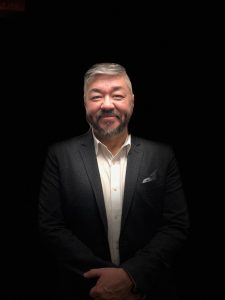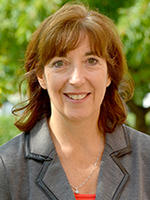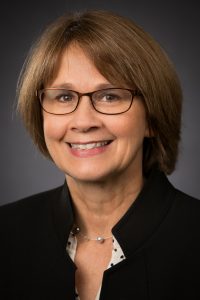Within the osteopathic medical learning environment, the considerations – not unlike those of other health education learning paradigms – encompass social, academic, professional, psychological, and physical settings and frameworks as they influence how people learn, organize, and collaborate together. Learner, faculty, and provider encounters with burnout, wellness, empathy, depression, anxiety, and interprofessionalism has risen to the forefront and the osteopathic medical education profession through it schools and its learners has been engaged in addressing these learning and practice environment issues. We will discuss some of these approaches and on-going concerns within the academic setting to positively affect teaching and learning.
At the Ohio State College of Nursing, our learning environment is illustrated by our commitment to LIVE WELL (Lead, Innovate, Vision, Execute, be Wellness-focussed, Evidenced-based, Lifelong learnings and Lights for the world, locally and globally). Evidence for our successful establishment of an effective environment for student learning in Nursing is our redesignation as a National League for Nursing Center of Excellence, recently awarded for our contributions to development of an environment that promotes student learning and professional development. We have extended our efforts towards student learning in interprofessional education, meeting future needs for learning among the healthcare workforce. Facilitation of learning in small groups through consistent participation in interprofessional seminars, development of collaborative learning opportunities in implicit bias among nursing and pharmacy students and clinical learning through establishment of advanced practice nursing and medical student dyads are among the activities that point to successful learning environments that promote interprofessional education. We developed and advanced the blueprint for interprofessional education of the future at Ohio State, BuckIPE, established an academic certificate in interprofessional healthcare and lead activities supported by a HRSA funded Primary Care Training Enhancement Grant that include interprofessional learning in community education, informatics, health coaching, hot spotting, immigrant healthcare and leadership. Process and outcome evaluation informs efforts to refine approaches and promote an effective learning environment.
“Learning Environment through the Lens of PA Education
Using the Gruppen review article as a backdrop, this portion of the webinar will focus on
learning environment in PA programs. At the conclusion of the webinar, attendees will
be able to discuss the components of how PA programs consider learning environment
through personal, social, organizational, physical and virtual lens, thus adding to the
interprofessional dialogue allowing for the identification of the elements of learning
environments that are shared across the health professions. New accreditation
standards for PA programs are being released Fall of 2018. This presentation will
describe the role the learning environment has in program accreditation.”
Presenter Bios
 Luke H. Mortensen, PhD, FAHA, FNAOME, is Professor and Chair of Pharmacology, Physiology, and Pathology at the Idaho College of Osteopathic Medicine in Meridian, Idaho, where he also serves as Director of Professional Development and Director of Interprofessional Education. Prior to these roles, he served as Vice President and Chair of Medical Education at the American Association of Colleges of Osteopathic Medicine (AACOM) from 2012-2017 where he engaged with their member colleges to promote teaching/learning excellence in osteopathic medical education throughout the educational continuum. His work also facilitated collaboration, provided services through constituent group activities, and developed resources for osteopathic medical education professionals. From 1995-2012, he was a tenured faculty member at Des Moines University where he taught clinical pharmacology and physiology for seventeen years and also served in administration as Assistant Dean and Director to develop and provide basic science and clinical professional development to faculty, OPTI members, residents, and others in a variety of health care professions. Dr. Mortensen has also played a significant role in the planning and implementation of workshop institutes for the Interprofessional Education Collaborative (IPEC) which seeks to promote and encourage efforts that would advance substantive interprofessional learning experiences to help prepare future health care providers for team-based practice. Luke received his doctoral training at Michigan State University, Lansing, Michigan and post-doctoral experience at the University of Texas Health Sciences Center in San Antonio, Texas. He is a Fellow of the American Heart Association and of the National Academy of Osteopathic Medical Educators.
Luke H. Mortensen, PhD, FAHA, FNAOME, is Professor and Chair of Pharmacology, Physiology, and Pathology at the Idaho College of Osteopathic Medicine in Meridian, Idaho, where he also serves as Director of Professional Development and Director of Interprofessional Education. Prior to these roles, he served as Vice President and Chair of Medical Education at the American Association of Colleges of Osteopathic Medicine (AACOM) from 2012-2017 where he engaged with their member colleges to promote teaching/learning excellence in osteopathic medical education throughout the educational continuum. His work also facilitated collaboration, provided services through constituent group activities, and developed resources for osteopathic medical education professionals. From 1995-2012, he was a tenured faculty member at Des Moines University where he taught clinical pharmacology and physiology for seventeen years and also served in administration as Assistant Dean and Director to develop and provide basic science and clinical professional development to faculty, OPTI members, residents, and others in a variety of health care professions. Dr. Mortensen has also played a significant role in the planning and implementation of workshop institutes for the Interprofessional Education Collaborative (IPEC) which seeks to promote and encourage efforts that would advance substantive interprofessional learning experiences to help prepare future health care providers for team-based practice. Luke received his doctoral training at Michigan State University, Lansing, Michigan and post-doctoral experience at the University of Texas Health Sciences Center in San Antonio, Texas. He is a Fellow of the American Heart Association and of the National Academy of Osteopathic Medical Educators.
 Cindy Anderson is the Associate Dean for Academic Affairs and Educational Innovation at the College of Nursing at The Ohio State University. Cindy has a BS in Nursing from Salem State University and a MS in Nursing and PhD in Physiology from the University of North Dakota. For more than 2 decades, Cindy Anderson have been dedicated to the education of nursing students at the baccalaureate, master’s and doctoral levels. She is the author of several book chapters and the text, Applied Pathophysiology: A Conceptual Approach to the Mechanisms of Disease”.
Cindy Anderson is the Associate Dean for Academic Affairs and Educational Innovation at the College of Nursing at The Ohio State University. Cindy has a BS in Nursing from Salem State University and a MS in Nursing and PhD in Physiology from the University of North Dakota. For more than 2 decades, Cindy Anderson have been dedicated to the education of nursing students at the baccalaureate, master’s and doctoral levels. She is the author of several book chapters and the text, Applied Pathophysiology: A Conceptual Approach to the Mechanisms of Disease”.
 Karen Hills is the Chief of Educational Development for the Physician Assistant
Karen Hills is the Chief of Educational Development for the Physician Assistant
Education Association (PAEA). She is Professor-Emeritus Department of Community
and Family Medicine at Duke University School of Medicine in Durham, NC. Before
joining PAEA, she was on faculty at the Duke University PA Program for 16 years
having served as program director from 2013-2017. She received her master’s degree in
health fitness management from the American University in Washington, DC and her PA
certificate from the Wake Forest University Physician Assistant Program. Her clinical
experience includes cardiology, family medicine, student health and working with
patients in a substance abuse treatment facility.
Ms. Hills has successfully submitted proposals for Title VII funding where she has served
as PI on projects related to faculty development, primary care enhancement and
combatting the opioid crisis.